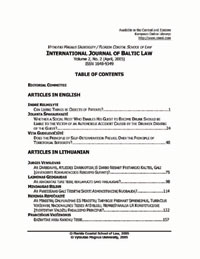Ar ministrų dalyvavimas ES ministrų taryboje priimant sprendimus, ... , neprieštarauja LR Konstitucijoje įtvirtintam valdžių padalijimo principui?
Whether participation of ministers at the EU in making decisions, does not violate the principle of separation of powers?
Author(s): Neringa RepeckaiteSubject(s): Law, Constitution, Jurisprudence
Published by: Florida Coastal School of Law and Vytautas Magnus University School of Law
Keywords: participation; ministers; European Union; Council of Ministers; making; decisions; superior; national; law; violate; principle; separation of powers; constitution; Republic; Lithuania
Summary/Abstract: WHETHER PARTICIPATION OF MINISTERS AT THE EUROPEAN UNION COUNCIL OF MINISTERS IN MAKING DECISIONS, WHICH ARE SUPERIOR OVER NATIONAL LAW, DOES NOT VIOLATE THE PRINCIPLE OF SEPARATION OF POWERS, SET IN THE CONSTITUTION OF THE REPUBLIC OF LITHUANIA? On May 1, 2004 the Republic of Lithuania became a member of the European Union (EU). Membership of the EU has influenced many important areas for Lithuania. The legal system, especially, has experienced many changes due to the harmonization of the national legal acts with the acquis communautaire of the EU. When harmonizing the national legal system, a lot of attention was paid to the constitutional grounds of membership in the EU. This field of harmonization is special due to the fact that the Constitution of Republic of Lithuania (RL) is the main law of the state regulating the essential fields of state organization and giving grounds to the whole national legal system. Under the Constitution of the RL, a minister belongs to the executive branch and therefore has the authority to adopt only substatutory legal acts. On the other hand, the ministers participate in making decisions within the Council of Ministers. The Council of Ministers adopts regulations, directives and decisions, i.e. legal acts mandatory for member states. A situation develops where the legal acts issued by the ministers at the EU level become supreme over the national laws legislated by the Seimas. Therefore the hypothesis is formulated that the participation of ministers at the Council of Ministers in making decisions having supremacy over national law is contrary to the principle of separation of powers set out in the Constitution of Republic of Lithuania. The analysis of jurisprudence, case law, the qualitative analysis of legal acts, and the comparative analysis have been used in order to examine the hypothesis. The paperwork consists of five main parts in which the concept of separation of powers in the Lithuanian legal system is analyzed, especially bearing in mind the role of the minister as a member of the executive branch. Attention is paid to the Council of Ministers, which is the main legislative institution of the Community, and to the peculiarities of the decision-making at the EU level. The decision-making process in the Council is characterized by the “democracy deficit”, which is manifested by the fact that the Community law is made by the executive, instead of the legislative branch. The issues of the lack of legitimacy and the distortion of the principle of separation of powers arise. The experience of Denmark, France, and Germany in solving this problem is briefly revealed. The thesis then focuses on the discussion and resolution of European Union affairs at the Seimas of Republic of Lithuania and analyzes the specialized parliamentary machinery in dealing with the misbalance of the state power institutions. The way to avoid ...
Journal: International Journal of Baltic Law
- Issue Year: 2005
- Issue No: 2
- Page Range: 132-156
- Page Count: 25
- Language: Lithuanian

